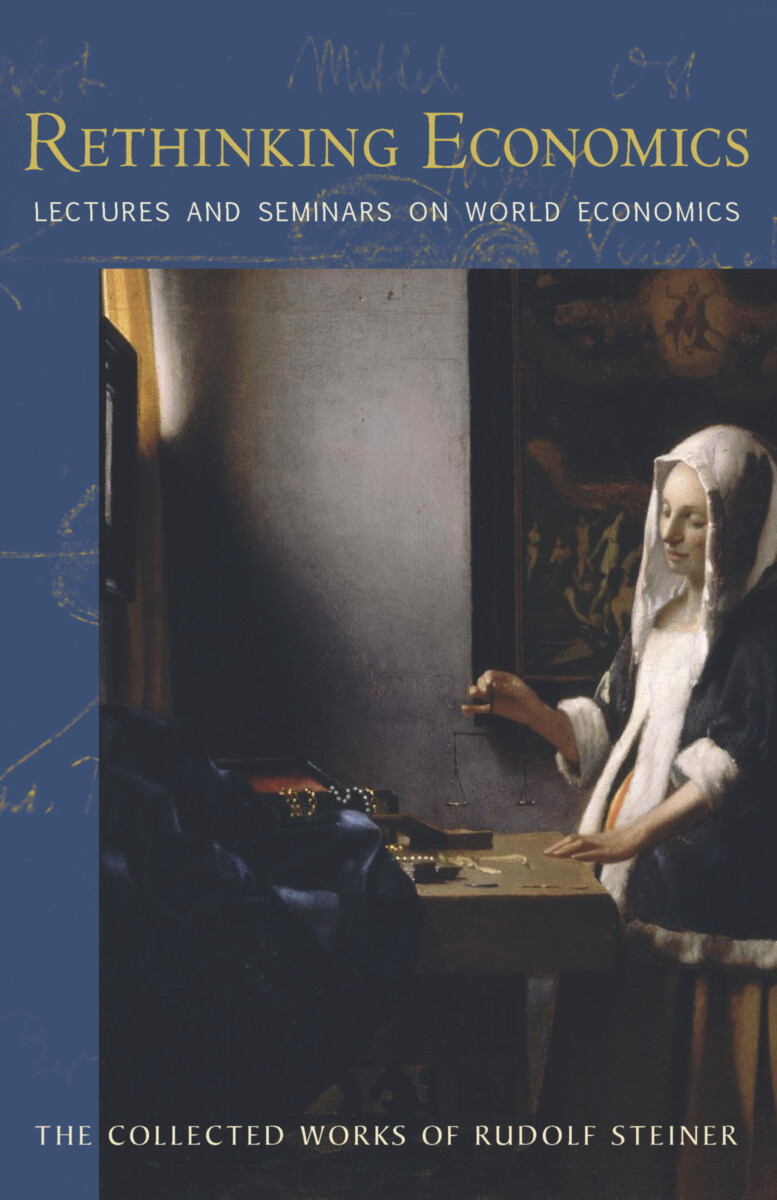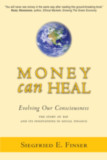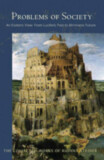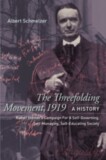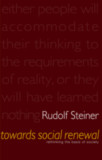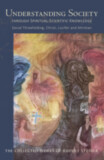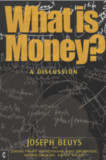Rethinking Economics
Lectures and Seminars on World Economics (CW 340, 341)
Foreword by Otto Scharmer
Introduction by Christopher Bamford
Preface by Mark Finser
Translated by Peter Clemm
- Publisher
SteinerBooks - Published
9th September 2013 - ISBN 9781621480495
- Language English
- Pages 310 pp.
- Size 6" x 9"
14 lectures in Dornach, July 14-August 6, 1922 (CW 340)
6 seminars in Dornach, July 31-August 5, 1922 (CW 341)
“In this age of social, economic, and ecological disruption, many people are beginning to realize that perhaps the most important root causes for this crisis originate in an economic thinking that is increasingly out of touch with the social, ecological, and spiritual realities of our time. How, then, can we rethink and redefine the fundamental economic concepts that frame our discussions and shape our key institutions in society today? This is the big question on the table today. Rudolf Steiner’s lectures on economics ... offer a largely unused gold mine of fresh economic ideas that could not be more timely and relevant” (from the foreword).
“The whole Earth, considered as an economic organism, is the social organism. Yet this is not being taken into account anywhere. It is precisely because of this error that the whole science of political economy has grown so remote from reality. People want to establish principles that are meant to apply only to an individual cell. Hence, if you study the French theory of economy, you will find it is constituted different from English or German or other economic theories. But as economists, what we really need is an understanding of the social organism in its totality” (Rudolf Steiner).
Rudolf Steiner gave this complex sequence of dense, subtle, multileveled lectures and seminars to students of economics in Dornach, Switzerland, during the summer of 1922. The course reflects a lifetime of thinking on the subject and marks the conclusion of his intense five-year period of activism in the service of social, political, and economic issues. During this time, which began as World War I was ending in 1917, he worked tirelessly to promote the cause of what he called “threefolding” (Dreigliederung), by which he meant rethinking the social order on the basis of clear separation and independence of the three fundamental spheres of activity that make up a society. He proposed three independent systems:
∞ an autonomous rights sphere (limited to judicial and political matters)
∞ an autonomous economic sphere (cooperative or associative by nature)
∞ and an autonomous spiritual-cultural sphere
The autonomy of these three spheres, he believed, would make possible a free, healthy, productive society and open the possibility of a lasting peace.
Rethinking Economics is essential reading for anyone who wants to understand the true nature of an economy and how it works. Steiner presents the basic elements of what it would take to create a just, socially responsible, and ecologically aware economy today.
This volume is a translation from German of Aufgaben einer neuen Wirtschaftswissenschaft, Bd.1, Nationalökonomischer Kurs (GA 340) and Aufgaben einer neuen Wirtschaftswissenschaft, Bd.2, Nationalökonomisches Seminar (GA 341), published by by Rudolf Steiner Verlag, Dornach, Switzerland.
C O N T E N T S:
Part I: Lectures:
1. The Transition from Industrial, National Economies to a World Economy
—Economy as it is spoken of today arose when modern economic life was already quite complicated. In first third of nineteenth century, instinctive trade relationships in England; in second third, consciously formed industrial economics in Germany; in the final third, the era of the state. Contrast between England and Germany in the 19th century. The threefold social order. Method of economy: ponderable and imponderable concepts. Economic theories must contain living ideas. Economic life between nature and capital. Intervention of state boundaries in economic life. The world as a whole economic organism, or social organism.
2. The Fluid Nature of Economic Processes
—The building up of price out of buying and selling cannot be grasped with tightly bounded concepts. The three production factors: nature, labor, and capital. The basic qualities of labor in the economic sense. Nature modified by labor is one aspect of value formation. Labor modified by Spirit (human intelligence or mind) is another aspect of value formation. The constant behind fluctuating values. The polarity of nature and capital.
3. Economics and Egotism
—Economics is both a theoretical and practical science. Integration of work in the social life. The emancipation of rights and labor. Striving for democracy and the division of labor. Anti-egotistical and cost-lowering function of the division of labor. Example of a tailor. Objective altruism required in the economic division of labor. Question: how does one bring out of the economic process labor as earnings? The wage earner as self-supplier. Price-increasing tendency of labor on nature and price-decreasing tendency through working with capital. Mean price through the intermediary or wholesale agent. The capitalist as merchant.
4. Labor and Value
—Example of tailor again. Origin of capital through the division of labor. Example of a wagon or cart. Capital: 1st stage attained through emancipation from nature; 2nd stage attained through emancipation from labor. Money-economics and money-capital. Money as realized Spirit. Loan capital as the second stage of the capital process. Division of labor, a relationship of commodities and the value of money. The value of nature is divided by the labor taken hold of by Spirit. Need to think the way into economic processes inwardly.
5. The Production and Consumption
—The economic process as an organic circulatory process. Building up of value and devaluation. Devaluation and value-building tensions through consumption. Personal credit and “real credit”: the first makes things cheaper; the latter, more expensive. Damming up or congestion of capital in the land; through this arises artificial value. Necessity to use up capital completely as seed. Associations must regulate the economic process through a proper distribution of workers. Price depends on the number of workers per a specific area.
6. Price, Cultural Activity, and Gift
—The formula or conception of the correct price. Low rates of interest make commodities less expensive, and land value higher. Spiritual-cultural work is, in relation to the past, unproductive and consuming; in relation to the future, it is productive. Payment, loan, and gift as necessary concepts for a healthy economy. Free and half-free spiritual-cultural life—spiritual-cultural life and economic life. Associations for the regulation of gifting
7. Price Formation
—Three motivating factors in economic movement: Purchase or sale, loan, and gift. The three factors of rent: labor, land, and capital. Value arises in the economy only in exchange of products. Loan relationship as a sale-purchase relationship. The price of land is brought about through power relationships, thereby a differential of fall in price from land products to industry. Tendency for rent of land. Tendency of the business person to devalue capital. Social tensions arising through the tendency for prices of farm products to increase and prices of products created by independent human will to decrease. The opposite movement in the economic circulation: of means of production to business capital and, on the other side, to commodities. Associations needed in order to balance out disturbances in the economic process.
8. Supply and Demand
—Correction of several economic concepts. Supply and demand. Three price equations. In the market, money becomes a rights factor. Impossibilities today: exchange between rights and commodities; between abilities and rights. Surplus value is a moral concept, not an economic one. Real judgments about the economic process not theoretical, but only possible through associations. Money cannot be understood by means of exchange. Exchange or barter economy (money economy); economy based on human faculties.
9. Trade, Loan, and Industrial Capital
—Indirect values in the economic relationships. Shoemaker’s products, price of rye, and services of the physician. Internal economy. Threefold productivity of redistributing capital through sale and purchase, loan, and gift—the last being the most productive. Trade capital in England—loan capital in France—industrial capital in Germany, and the human faculties behind them all. The nature of banking; non-personal money circulation and objectless imperialism.
10. Associations
—Economic profit. In the act of exchange both sides profit. Origin of money from commodities. Push and suction in the economic process. Mutuality in the economic process. Interest: arises through forfeiting mutuality in a loan, which is repaid or made up by lending again. Method: think the economic process in pictures. Self-active reason and objective community spirit in associations stands above personal interests. Objective selflessness instead of subjective morality. Economic life between the rights life and the spiritual-cultural life.
11. World Economy
—The development of the economic life from rural, personal economy to world economy. Hindrance through the state economy. England as the leading economic power. Economic thinking did not progress. World economic thinking. Closed economy is the cardinal problem of world economy. The significance of the length of the life of economic products. Money does not become used up as compared to commodities. The relationship of those who are seeking food to those who offer food. Necessity of gifts in the closed economic domain. The relationship of food production (free gifts) cultural life.
12. Money
—What works behind price formation: the objective in the subjective. Money and its conventional characteristics. Money as a medium of exchange. It arises out of commodities, but is an unreal competitor of commodities. As loan money, it receives its value through the human Spirit. As gift money, it is given for education or as a grant and is protected from being capitalized in the land. Transition of loan money into gift money. Metamorphoses of money in the economic process. Aging and dying of money. Old money as gift money. Balance among purchase money, loan money, and gift money. Rejuvenation and management of money is mediated through an association.
13. Spiritual–Cultural Needs
—The economic value of spiritual–cultural accomplishments. The starting point for all economics—working on the land. Example of the closed village economy. Valuation of spiritual–cultural accomplishment according to the labor it saved. Valuation of manual labor in relation to the spiritual–cultural. The relation of land production to spiritual-cultural production.
14. World Economy: Living Concepts
—Living pictures, not dogmatic concepts, in the examination and analysis of money and price. Money as world bookkeeping. Token value and real value. Money is principally means of exchange. Falsifications through intermediate or wholesale trade with money. Money as indicator. Work applied to nature as the builder of economic value. Amount of money as expression of the sum total of the usable means of production. Nature currency. Concept of means of production. The final basis of price: the ratio of the number of people to the amount of usable land in a specific area. The empty phrase, convention, and routine hold sway today.
Part II: Seminars:
First Seminar
—Thinking about economics is no longer creative, merely observational. The method of economic thinking in accord with reality is the formation of concepts that characterize, not concepts that relate to the law. A method that is neither deductive, inductive, nor derived from theory, but that only describes the facts. Economic inspiration and symptomatic observation. The accordance with reality of “The Social Question.” The conditional validity of the ironclad wage law of Lassalle. The recurrent method: leads to causes from the quality of the effects. The revenue creating effect of inflation on the state.
Second Seminar
—Economics and physical processes. “Acknowledgment” not a category in economics. Biological thinking in economics: building up, tearing down; creating value, destroying value. Value is a function of work having a natural objective. Work of head and work of hands are not really opposites. The antithesis of work in the physical sense and in the economic sense. Valuation of overtime work.
Third Seminar
—The character of politics. What is “real” politics? Example of the tailor illustrates the division of work between producers and dealers. Division of work means to fructify it. The relationship between consumers and producers can be made apparent only through an organization of members. The cost relationship between agriculture and industry. The division of work and its limitations. The necessary number of dealers—what is too many or two few. Threefolding of city constitutions.
Fourth Seminar
—The nature of work. Creation of value and its devaluation. Consumption is not work in an economic sense. The destructive work of the war industry. General economic concept of work; consumable product; economic value of work accords with the principle of reciprocity. Work tied to an object; free spiritual–cultural work. Subtle, instinctive economy in ancient Rome. The devaluating function of giving.
Fifth Seminar
—The nature of money: monetary value, the gold standard, distressed currency, balance of payments, lending and giving. Personal credit must replace credit based on real property. Giving must develop out of large lending. Cause of devaluation of the German and Austrian currency. Nominalists and “metalists,” both correct depending on circumstances. Means of production as merchandise and its reversion to simple nature. Capital as agency for enterprise. Loan and price spirals. Proper loans are possible only in an associative economy.
Sixth Seminar
—Discontinuing the use of money. Difference between purchasing power and the valuating power of economics. Decreasing valuating power over time: eventually becomes gift money. The old Hebrew jubilee year. The value and usefulness of money is due to the abundance of the means of production. The life limitation of the means of production corresponds to the life of the currency when limited by associative economics. Banks for gift money and banks for work income. Conflicting tendencies of national and world economies in Anglo-Saxon countries. World economy and political intention. Threefolding of the human being and the social organism.
Rudolf Steiner’s Collected Works
Significant Events in the Life of Rudolf Steiner
Index
Rudolf Steiner
Rudolf Steiner (b. Rudolf Joseph Lorenz Steiner, 1861–1925) was born in the small village of Kraljevec, Austro-Hungarian Empire (now in Croatia), where he grew up. As a young man, he lived in Weimar and Berlin, where he became a well-published scientific, literary, and philosophical scholar, known especially for his work with Goethe’s scientific writings. Steiner termed his spiritual philosophy anthroposophy, meaning “wisdom of the human being.” As an exceptionally developed seer, he based his work on direct knowledge and perception of spiritual dimensions. He initiated a modern, universal “spiritual science” that is accessible to anyone willing to exercise clear and unbiased thinking. From his spiritual investigations, Steiner provided suggestions for the renewal of numerous activities, including education (general and for special needs), agriculture, medicine, economics, architecture, science, philosophy, Christianity, and the arts. There are currently thousands of schools, clinics, farms, and initiatives in other fields that involve practical work based on the principles Steiner developed. His many published works feature his research into the spiritual nature of human beings, the evolution of the world and humanity, and methods for personal development. He wrote some thirty books and delivered more than six thousand lectures throughout much of Europe. In 1924, Steiner founded the General Anthroposophical Society, which today has branches around the world.


